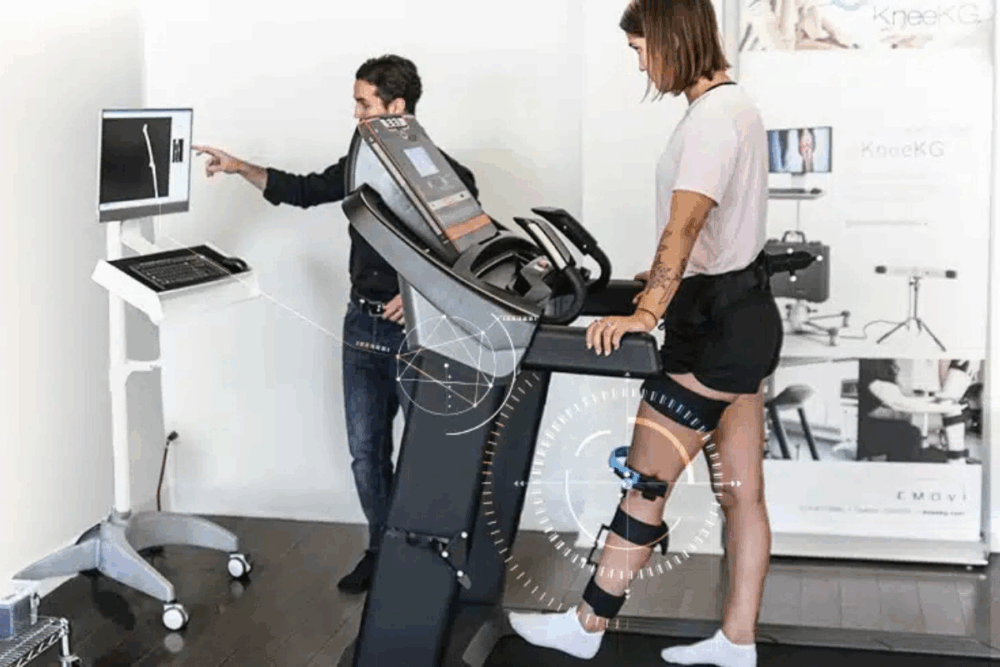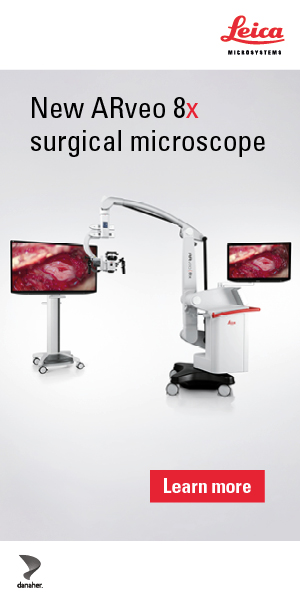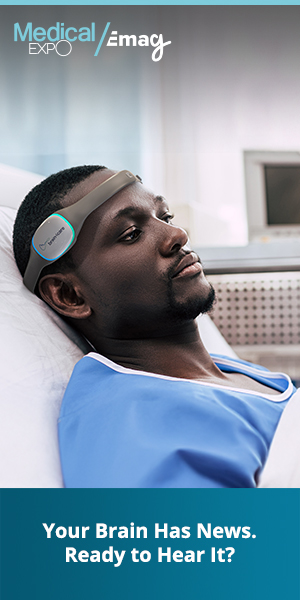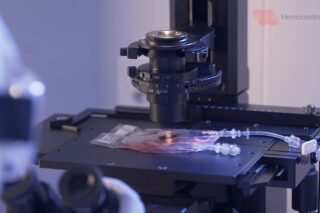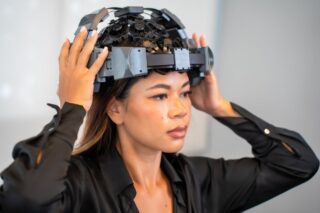With its unique KneeKG technology, Montreal-based medtech Emovi aims to transform how knee pathologies are assessed, treated, and personalized. During the Effervescence Forum we were invited to a dozen of days ago in Montreal, Canada, we spoke with Alex Fuentes, Chief Scientific and Technology Officer, to unpack this disruptive innovation.
A New Map of the Moving Knee
In a context where musculoskeletal disorders—particularly osteoarthritis—are placing increasing strain on healthcare systems, the need for more accurate and predictive functional assessment tools is growing. That’s precisely what Emovi offers with KneeKG, a technology born from biomechanics research and powered by artificial intelligence.
“KneeKG is a play on words with ECG. Just like an electrocardiogram traces cardiac function, we trace the joint function of the knee,” explains Alex Fuentes, Emovi co-founder and a PhD in biomechanics.
Unlike traditional medical imaging—X-rays or MRIs—which provide static views, KneeKG offers a dynamic visualization of the knee joint in motion, in conditions close to real life.
Practically, the system uses an infrared sensor typically used in assisted surgery and a lightweight exoskeleton attached to the leg, which tracks the 3D movement of the femur and tibia as the patient walks on a treadmill. The data is then analyzed by AI software that identifies functional deficits, links them to symptoms, and suggests personalized treatment options.
A Technology Bridging Imaging and Therapy
What Emovi offers goes well beyond diagnosis. The goal is to provide professionals with a real decision-support tool.
“Doctors don’t want to treat just an image, but a patient. They want to understand function. We focus on identifying, at the individual patient level, abnormal movements or functional issues in the knee. This allows us to better understand how those irregularities relate to symptoms—because symptoms typically appear during movement,” insists Fuentes.
Through clinical studies, they showed that traditional imaging results (like MRIs or X-rays) do not strongly correlate with patients’ symptoms. For Mr. Fuentes, this scientific research demonstrates that abnormal movement patterns and functional deficits are much more closely linked to what patients actually feel.
“This is important because it means we can target modifiable problems—issues we can address without always resorting to surgery. If a patient has a functional deficit and surgery is the only option being offered, that might not be the most appropriate solution. Our approach aims to have an impact in both surgical and non-surgical treatments.”
Post-operatively, the solution is particularly relevant for knee replacement procedures.
“There’s a high rate of dissatisfaction after knee surgeries—one in five patients is disappointed. We help better prepare patients, personalize implant selection, and optimize alignment,” the researcher points out.
After surgery, Emovi also offers custom exercise programs, educational modules, and digital follow-up to support rehabilitation.
“Just because you replace the articular surfaces doesn’t mean you regain the mobility of a 20-year-old. You have to work on joint function,” he notes.
To date, studies conducted by Emovi have shown, the company says, significantly improved clinical outcomes compared to standard care.
“We conducted the largest study in Canada on osteoarthritis, a condition involving the degeneration of cartilage in the joints. Our research showed that there was no increase in healthcare system costs associated with our approach. However, we observed significant improvements in patient outcomes—including better clinical condition, higher patient satisfaction, and stronger adherence to treatment plans.”
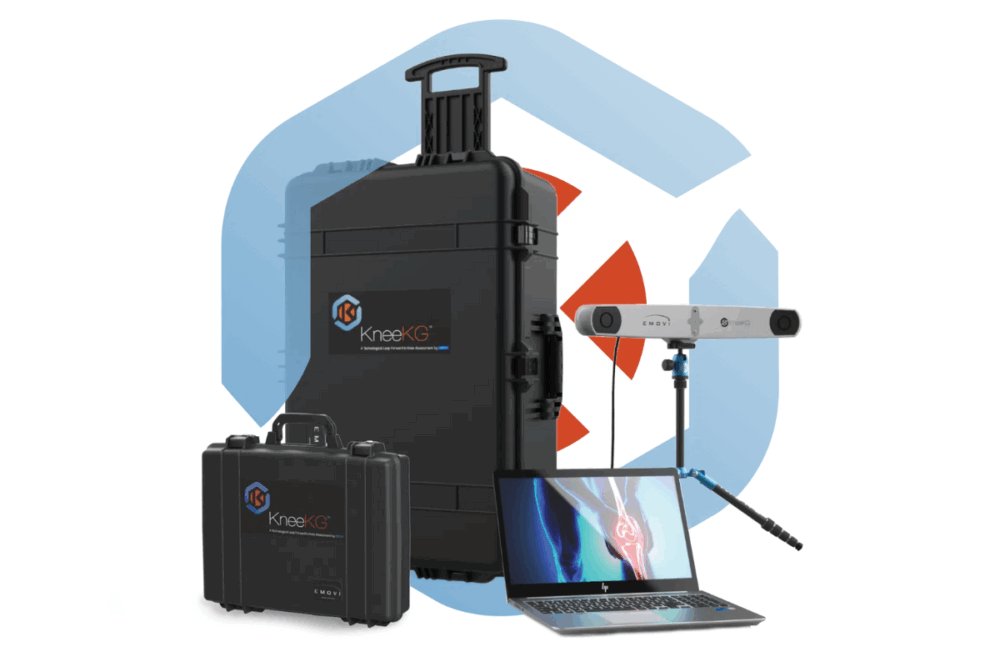
A Data-Driven, AI-Enhanced Approach
One of the technology’s major strengths lies in its AI engine. Emovi has developed classification algorithms capable of predicting with 85% accuracy whether a patient is a good surgical candidate or not, based on the biomechanical data collected.
“We were able to correlate our results with decisions made by orthopedic surgeons. This allows us to more accurately guide patients along their care pathway,” explains Fuentes.
This algorithmic filtering is particularly relevant in overloaded systems like Quebec, where wait times to see a specialist can stretch for months. Thus, KneeKG can help decongest hospital services by avoiding unnecessary consultations and quickly directing patients to appropriate care—whether physiotherapy, bracing, or surgery.
Seamless Integration into Care Pathways
KneeKG is a lightweight, mobile, and non-invasive technology, requiring no radiation or dedicated room. It can be installed in family medicine clinics, physiotherapy practices, or hospital departments.
“We’ve trained nurses, imaging techs, physios… The goal is to democratize use without overloading skill sets,” says Fuentes.
To ease adoption, the reports are designed as clear dashboards, similar to bloodwork: key indicators, color coding, and guided interpretations.
The system is also designed to be economically flexible. The business model combines the sale of the physical device (camera, exoskeleton) with a SaaS subscription for the software. In terms of per-exam cost, a KneeKG session averages $185, compared to $600–800 for an MRI—a difference that appeals to payers.
Gradual but Targeted Adoption
The technology is currently commercialized in 10 countries, including Canada, the U.S., and France. It holds FDA, Health Canada, and CE (Class II medical device) approvals. Initial commercial targets include orthopedic surgeons and sports medicine physicians, and in some cases, radiologists and family doctors.
In Quebec, KneeKG is reimbursed by some private insurers, and a government-funded pilot project is currently assessing its impact on reducing waitlists—a promising step for broader rollout.
Broad Clinical and Athletic Applications
KneeKG is suitable for a wide range of conditions: osteoarthritis, tendinopathies, chronic pain, ligament injuries, and more. Only pathologies with a strong inflammatory component, such as arthritis, are less directly addressed.
Beyond clinical use, Emovi is also working with elite sports and military organizations.
“We’re collaborating with the U.S. Army to monitor injured soldiers during running and jumping. In pro sports like football and rugby, our solution helps identify biomechanical weaknesses before injuries occur,” reports Fuentes.
Since the system is easily transportable, it can follow athletes on the road, fits into field kits, and is used for prevention.
“The sports world is more sensitive to preventive investment because every day a player is off the field is a financial loss,” he adds.
While Emovi actively advocates for prevention beyond sports, public health priorities remain treatment-focused.
“Even if we show the benefits, budgets are rarely allocated upstream.”
But with an aging population, early intervention would clearly save money and improve outcomes.The future may well validate this approach. For example, each year in France, between 90,000 and 100,000 knee replacements are performed—a number that has been steadily increasing over the years.
Emovi is already working on additional joints, such as the hip and shoulder, with the same philosophy: measure function, understand mechanics, and act early.
A Quebec Technology with Global Ambitions
Thanks to a locally based supply chain in Canada, Emovi was able to maintain industrial independence during the COVID crisis. The company is now preparing for the potential impact of new U.S. tariffs, even as it sees sustained growth in that market, including traction from the Department of Defense.
Key Figures:
- Average cost per KneeKG exam: ~$185 CAD
- Countries sold in: 10 (Canada, USA, France, Switzerland, etc.)
- Certifications: CE Mark, FDA, Health Canada
- AI-based surgical triage accuracy: 85%
- Target users: Orthopedic surgeons, sports medicine physicians, family doctors, radiologists, military, pro sports teams
